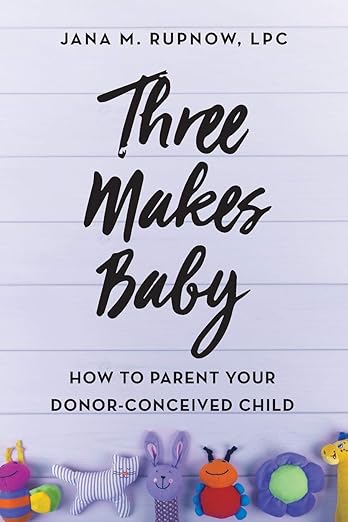
Uncharted Waters: Navigating the Emotional Waves of Egg Donation
In our society, the expectation of conceiving and starting a family is deeply ingrained; we often take it for granted that having biological children is straightforward. Yet for countless individuals and couples, who rely on third party reproduction, the reality can be quite different. Requiring the help of an egg donor can be emotionally challenging on many levels. It’s a moment that potentially reshapes dreams and initiates a complex journey many intended parents didn’t anticipate.
In this blog, our guest author and fertility counselor, Jana M. Rupnow, MA, LPC, addresses a multitude of emotions that may accompany the need for donor eggs. From initial shock and grief, to ultimate hope and resilience, she explores the psychological rollercoaster accompanying this diagnosis. By shedding light on these feelings, we endeavor to offer support and encouragement for those traversing this often-unexpected path.
"I understand that facing the grief and loss related to the inability to conceive naturally is a complex and deeply personal experience. It's a journey I've seen many individuals go through, and I've gathered some insights that might help you navigate these emotions." Jana M. Rupnow, MA, LPC - Three Makes Baby

- Recognize Your Grief: First and foremost, it's essential to acknowledge that what you're feeling is grief. Infertility grief doesn't come from an isolated incident but accumulates over time. The losses might include hope, time, money, control, health, spiritual beliefs, genetic connection, and many others. Recognizing these losses is the first step in dealing with them.
- Understand the Nature of Complicated Grief: Your grief might be more complicated and intense because of the multiple losses associated with infertility. Feelings such as shame, depression, or anxiety are often part of this complicated grief. Know that this is a natural reaction and not something you need to face alone.
- Seek Professional Help if Needed: If you feel that your grief is becoming too overwhelming, don't hesitate to seek professional counseling. A counselor can help you learn about the grieving process and guide you through it.
- Feel It to Heal It: As I often say, you must feel it to heal it. Give yourself permission to grieve and to feel the loss. Allow yourself to experience the emotions that come up, whether it's anger, guilt, sadness, or resentment. It may feel like surfing waves of emotion, with big waves crashing and knocking you down. But with time and new skills, you can learn to surf the emotion with grace.
- Distinguish Your Feelings from Your Child's: If you're considering donor conception or adoption, it's vital to separate your emotions about infertility from what you think your child might feel about their origin. Remember, your child may have different reactions, so keep an open mind.
- Look for the Opportunity in the Crisis: The Chinese use two characters to depict a crisis: danger & opportunity. In your grief, you may find an opportunity for growth and transformation. By moving through grief, you can find a new hope or vision for your future.
- Embrace a New Dream: The grieving process may take you to a dark place, but it can also lead to growth and change if you let it. Just like a caterpillar transforming into a butterfly, you can find beauty and new capabilities in your grief. Finding ways to make meaning from your loss, whether through community engagement, helping others, or personal growth, can lead to joy and fulfillment once again.
Grief is not a linear process, and it may feel cyclical at times. Be gentle with yourself and know that it's normal to feel a range of emotions, sometimes all at once. The most important thing is to allow yourself to feel and to seek support if you need it. You're not alone in this journey, and with proper awareness and attention to your emotional needs, you can find healing and hope.
Additionally, I've identified several common concerns and psychological reactions that people often experience:- Child's Well-Being: One of the first concerns that parents often express is how their child might react once they know about their donor conception. They might worry about their child feeling different or experiencing negative emotions like sadness or anger.
- Parental Alienation: Many parents grapple with the complex emotions around their own role as the "real" parent. This might include concerns that they or their child will think about the donor or treat the situation differently from having a genetic child.
- Social Alienation: In my work, I've seen how people can become apprehensive about how society, friends, and extended family will respond to their decision. They may feel different from other families or feel the need to maintain a sense of normalcy by keeping the matter private.
- Family and Cultural Alienation: A profound worry I've noticed is that family members might disapprove or that cultural communities might not understand. This concern can lead to feelings of isolation within one's family or cultural group.
- Lack of Knowledge and Understanding: Many individuals are uncertain about how to approach telling their child about donor conception. They might feel overwhelmed by the need to answer questions, decide when to discuss it, or even understand why it's essential to address.
- Complex Emotions: The emotional landscape around needing an egg donor is rich and multifaceted. Parents might feel a blend of hope, anxiety, fear, excitement, and uncertainty as they navigate this new territory.
- Need for Support and Guidance: Recognizing these reactions, I've often guided parents towards seeking support through counseling or community groups. Tools like rating agreement with various statements related to these concerns can help parents identify specific areas of worry and focus on addressing them.
In Three Makes Baby, I emphasize the importance of understanding and managing these concerns by identifying them and working through them, possibly with professional support. Recognizing that these reactions are both common and personal allows us to approach them with empathy, patience, and a tailored plan for each unique family.
By openly discussing the psychological aspects surrounding egg donation, our third-party reproductive community serves to foster understanding and compassion. In sharing experiences and successful outcomes, we work towards reducing the stigma surrounding assisted reproductive technologies. Through these conversations, a sense of community is built – one that resonates with shared hope and helps others who may feel alone in their journey. Together we can cross the uncharted waters of this unique, but proven, path to parenthood.
Jana M. Rupnow, MA, LPC
Jana M. Rupnow, LPC is a internationally recognized fertility mental health expert. Jana is a licensed counselor in Dallas, TX, offering counseling services locally and speaking and consulting internationally.
Jana's best-selling book, Three Makes Baby-How to Parent Your Donor-Conceived Child, introduced the field to the "five common fears" that parents-to-be face as they contemplate having a non-biological child. Thousands of readers around the world have trusted her work because Jana knows what it’s like to be in a non-biological family, as an adoptee and adoptive mom.
In addition to her acclaimed book, you can check out her Three Makes Baby Workbook, listen to the Three Makes Baby Podcast and explore her Parent Courses and Workshops .
Looking for a wide selection of egg donors?
Visit our directory of the best egg donor clinics & agencies in the U.S.